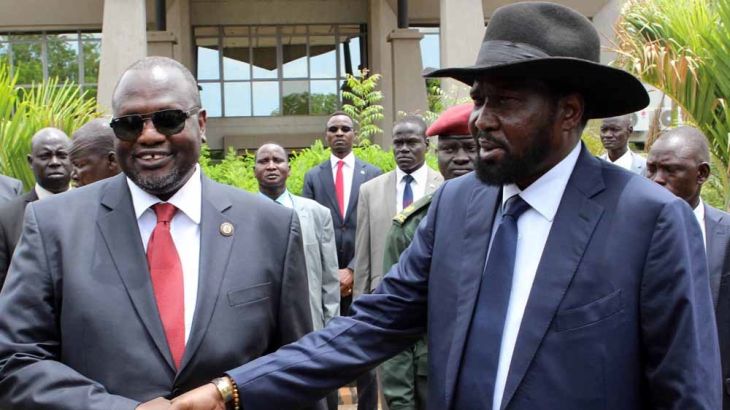
Salva Kiir and Riek Machar: South Sudan’s shaky peace
President Salva Kiir and Vice President Riek Machar discuss the prospects for peace and reconciliation in South Sudan.
South Sudan became the world’s youngest nation in July 2011, but despite independence the country went to conflict again two years later, when civil war broke out – leaving tens of thousands dead, more than two million people displaced and an economy in ruins.
In 2013, former rebel leader and Vice President Riek Machar was sacked by President Salva Kiir in a cabinet purge. Later that year, Kiir accused him of plotting a coup, which prompted Machar to flee the capital, Juba.
Keep reading
list of 4 itemsSouth Sudan President Kiir integrates rival’s officers into army
South Sudan: President Kiir, VP Machar agree to resume talks
Will South Sudan’s latest peace deal last?
Machar denied the allegation, but the incident triggered South Sudan’s vicious civil war.
After protracted negotiations by regional mediators, a peace deal was achieved between both sides in August last year and Machar has been sworn in again as vice president.
Kiir and Machar have agreed to share power and are now tasked with rebuilding the world’s youngest country which has been devastated by the conflict.
South Sudan is facing severe economic problems, and a deal with international donors has yet to be implemented.
“Whenever there are displaced people, or there are refugees, the solution is always money so that you can settle them. And then you get them food, medicine, everything so that they live comfortably, whether they are foreigners or citizens. So our problem is money. We have no money,” says Kiir.
Riek Machar’s delayed but much-publicised return should mean a positive working relationship with his rival Salva Kiir, but the key question is: Can they work together? And are they aiming for the same goals?
“We are unified now … As the government of national unity, we are functioning smoothly,” Salva Kiir says.
But asked about the agreement and his message to Riek Machar, Kiir says: “When you preach messages of hate, probably you are going to divide the people.
“The problem, that we are not moving smoothly on the implementation of the agreement, is the way the agreement was designed. And when I signed this agreement in August last year – I said this in front of the president of Uganda – I told him that this agreement was not made to be implemented.”
When confronted with Kiir’s doubts about the implementation of the agreement, Riek Machar says:
“Well, he hasn’t told me that. Because we have been discussing the implementation of it. So I expect that he will respect this bargain in the agreement. [I expect him to] Implement it by spirit and the letter of the agreement.
“The agreement is a roadmap, first for reform, and for establishing the new system of governance in the country, which will lead us to a democratic election. This is the aspiration of the people of Sudan. After independence, they want a democratic election to take place.”
Al Jazeera’s Peter Dobbie sat down with President Salva Kiir and South Sudan’s first Vice President Riek Machar in the capital, Juba, to find out how they see their role in the reconciliation process and what they are planning to do to solve the many problems facing the world’s youngest nation. They also discuss their relationship, the role of the international community, and the prospects for peace and unity.
You can talk to Al Jazeera too. Join our Twitter conversation as we talk to world leaders and alternative voices shaping our times. You can also share your views and keep up to date with our latest interviews on Facebook.